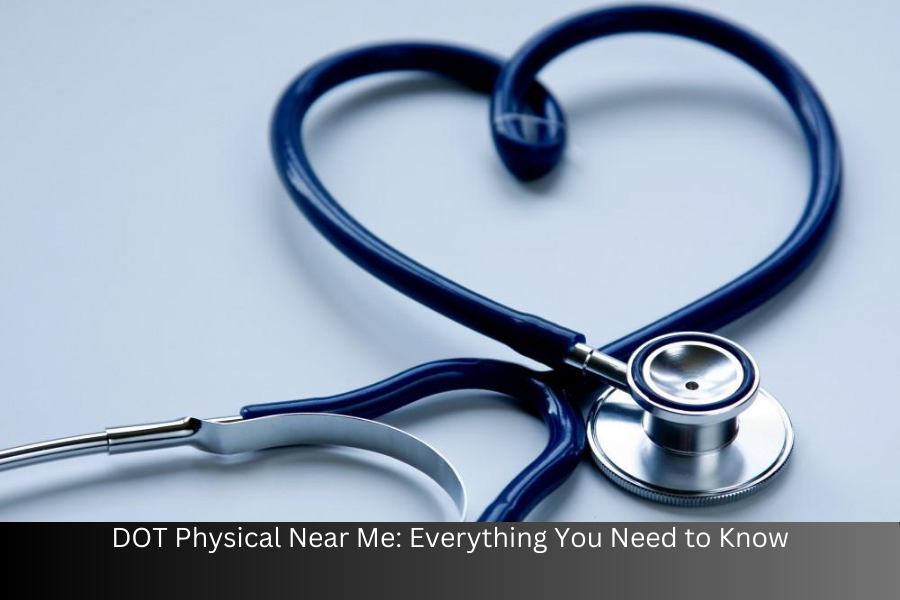What Is a DOT Physical Near Me?
A Department of Transportation DOT Physical Near Me physical is a specialized medical exam required for commercial drivers in the United States to ensure they’re physically and mentally fit to operate commercial vehicles. This exam is a legal requirement, mandated by the Federal Motor Carrier Safety Administration (FMCSA), and applies to drivers who operate vehicles like trucks, buses, and other large commercial machinery. If you’re a driver or aspiring to become one, the DOT physical is crucial for meeting federal and state regulations.
Why Are DOT Physicals Important?
DOT physicals aren’t just routine checkups; they’re essential to ensure the safety of drivers and everyone else on the road. The job of a commercial driver is demanding, often involving long hours, intense focus, and the ability to handle physically challenging situations. The DOT physical helps prevent health-related issues that could interfere with safe driving, reducing the likelihood of accidents due to sudden health complications. A driver’s well-being affects their performance, which impacts road safety for all.
What Does a DOT Physical Involve?
The DOT physical covers several key health aspects that directly relate to a driver’s ability to operate a commercial vehicle. Here’s a breakdown of the areas tested and what each one involves:
- Vision: Good eyesight is essential for safe driving. DOT regulations require that drivers have at least 20/40 vision in each eye, with or without corrective lenses, and a minimum field of vision of 70 degrees in each eye. Drivers must also be able to distinguish colors on traffic signals.
- Hearing: Hearing loss can impair a driver’s ability to hear warnings and signals on the road. The DOT requires that drivers have a hearing threshold where they can perceive a “forced whisper” from at least five feet away. If a driver uses hearing aids, they’re allowed during the test.
- Blood Pressure and Heart Health: Hypertension, or high blood pressure, is a common condition that needs to be controlled. During the physical, your blood pressure will be checked. Drivers with high blood pressure may still pass the exam but might be issued a shorter certification period to encourage monitoring and management.
- Urinalysis: A basic urinalysis is part of the DOT physical to detect underlying health issues like diabetes. This test checks for sugar, protein, and other indicators that could signal potential health concerns.
- Neurological and Reflexes Check: This part of the exam assesses reflexes and neurological responses, ensuring the driver’s physical coordination is intact.
- Lung and Respiratory Health: Since drivers may be exposed to dust, chemicals, and environmental changes, lung function is critical. The doctor checks for any signs of respiratory issues that could impede driving performance.
How to Find a DOT Physical Near Me
Finding a DOT physical provider is relatively simple but varies by location. If you’re unsure where to go, there are several options to explore:
- Search Online Directories: Websites such as the National Registry of Certified Medical Examiners (NRCME) maintain lists of certified medical examiners authorized to conduct DOT physicals. You can filter by zip code to find the closest provider.
- Pharmacies and Retail Clinics: Many major pharmacy chains and retail clinics now offer DOT physicals as part of their health services. Locations like Walgreens, CVS MinuteClinic, and Walmart Health often have certified providers on site.
- Local Medical Clinics: Check with local urgent care centers, occupational health clinics, and primary care facilities. Many of these have certified DOT providers available.
- Mobile DOT Physical Services: In some areas, mobile services can come directly to your location. These are especially useful for companies that need to have multiple drivers certified at once.
What to Expect During the DOT Physical Exam
Knowing what to expect can help ease any nerves and ensure you’re fully prepared. Here’s a typical sequence of steps during a DOT physical:
- Medical History Review: You’ll start by filling out forms detailing your health history, including past surgeries, medications, and any current medical conditions. Be as honest and thorough as possible; this helps the doctor assess any potential issues.
- Vital Signs and Physical Examination: The doctor will check your pulse, blood pressure, height, and weight to ensure everything falls within safe ranges for driving. Any major deviations could impact your certification period.
- Vision and Hearing Tests: The vision and hearing tests are quick but crucial. The doctor will evaluate whether you meet the minimum requirements and may advise corrective lenses or hearing aids if needed.
- Urinalysis and Lab Tests: A urinalysis checks for blood sugar levels, as well as proteins and other markers of overall health. Although this isn’t a drug test, it’s an important part of assessing conditions like diabetes.
- Specific Health Checkups: Depending on your medical history, the doctor may conduct additional tests related to cardiovascular health, respiratory function, or neurological responses.
Tips for Preparing for Your DOT Physical
A little preparation can make a big difference in passing your DOT physical. Here are some tips to help you get ready:
- Get a Good Night’s Sleep: Resting well the night before can stabilize your blood pressure and heart rate, which are important factors in the exam.
- Limit Caffeine and Salt Intake: Both caffeine and salt can elevate blood pressure. Limiting these, especially on the day of your physical, can help you achieve a more accurate reading.
- Take All Required Medications: If you’re on prescribed medications, take them as usual before your exam, and bring a list of these medications to show the doctor.
- Bring Medical Documents and History: Bring any relevant medical records, including results from previous physicals and any recent test results, particularly if you have a medical condition that may require closer examination.
How Often Are DOT Physicals Required?
A DOT physical is typically valid for two years. However, if you have certain medical conditions, like hypertension or heart issues, the medical examiner may issue a certificate for a shorter period. Drivers with controlled hypertension, for instance, may receive certification valid for one year rather than two.
Cost of a DOT Physical and Payment Options
The cost of a DOT physical varies widely depending on where you go, ranging from about $50 to $150. Some clinics and mobile services offer discounts, especially for companies sending multiple employees. It’s essential to verify whether your health insurance covers any portion of the cost. While DOT physicals aren’t typically covered by insurance, some workplaces may reimburse or cover the cost as part of employment requirements.
What to Do If You Don’t Pass
If the medical examiner finds an issue that prevents you from passing, it’s not the end of the road. Many conditions, such as high blood pressure or vision impairment, can be managed or treated. If you’re close to the requirements, the examiner might issue a temporary medical certificate and recommend lifestyle changes, additional tests, or a follow-up exam.
- Temporary Disqualification: For manageable issues, a temporary disqualification might be issued. This simply means that you’ll need to meet specific health criteria before you’re re-tested and certified.
- Request a Second Opinion: If you believe you were wrongly disqualified, you have the right to seek a second opinion from another certified medical examiner listed on the NRCME.
Why Ongoing Health Monitoring Matters for Drivers
Even after passing a DOT physical, it’s beneficial to maintain regular health checkups, especially if you have health conditions that could worsen with age or lifestyle factors. Regular monitoring helps drivers stay proactive about their health and reduces the risk of disqualification in future exams.
Conclusion
The DOT Physical Near Me is an essential step for commercial drivers, ensuring that you’re healthy and fit to meet the challenges of life on the road. From vision and hearing to blood pressure and overall physical health, this exam checks every detail that could impact your driving abilities. Finding a certified provider nearby and preparing properly for the DOT physical can simplify the process, help you meet federal requirements, and keep you safely employed in your career. By staying informed about what the DOT physical involves and keeping up with regular health checks, you’re not only protecting your livelihood but also contributing to road safety for everyone.
FAQs About DOT Physical Near Me
Q: How can I find a DOT Physical Near Me?
A: You can find a DOT physical provider by searching online directories, visiting local pharmacies or retail clinics, checking with your employer, or using the National Registry of Certified Medical Examiners (NRCME) to locate a certified provider in your area.
Q: What should I bring to my DOT physical?
A: Bring any relevant medical documents, a list of medications, and your ID. It’s also helpful to bring glasses or contact lenses if you need them for vision, as well as hearing aids if required.
Q: How long does the DOT physical exam usually take?
A: A DOT physical exam generally takes about 30 minutes to an hour, depending on your health and any additional tests needed.
Q: Can I fail a DOT physical?
A: Yes, if you have certain uncontrolled health conditions, like severe high blood pressure or untreated vision issues, you may not pass the exam. However, many issues are manageable, and you can often reapply after addressing the health concern.
Q: Do DOT physicals test for drugs?
A: The DOT physical itself doesn’t include a drug test. However, your employer may require a separate drug test as part of the hiring or certification process.
Q: How often do I need a DOT physical?
A: Typically, a DOT physical is valid for up to two years, but drivers with certain health conditions, like controlled high blood pressure, may need annual exams.
Q: How much does a DOT physical cost?
A: Costs vary, generally ranging from $50 to $150 depending on the provider. Some employers cover the cost, and some clinics offer discounts, especially if you’re part of a fleet.
Get the latest scoop and updates on playhop




